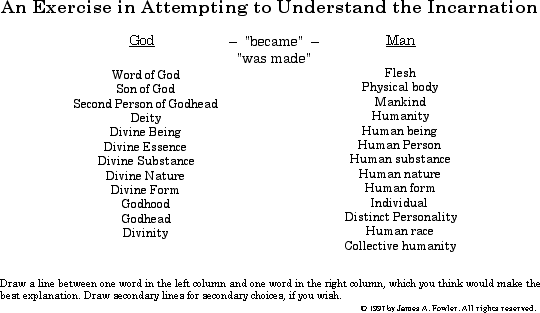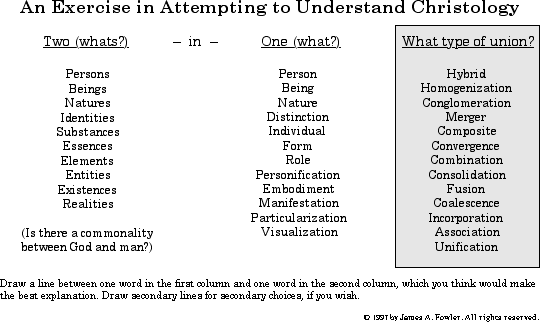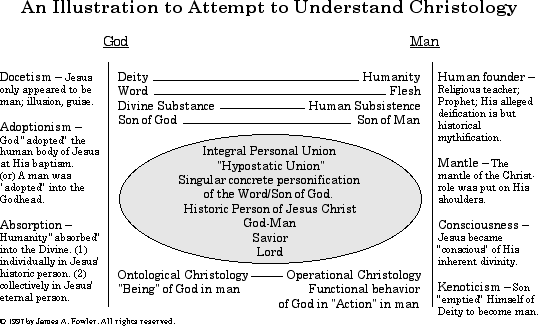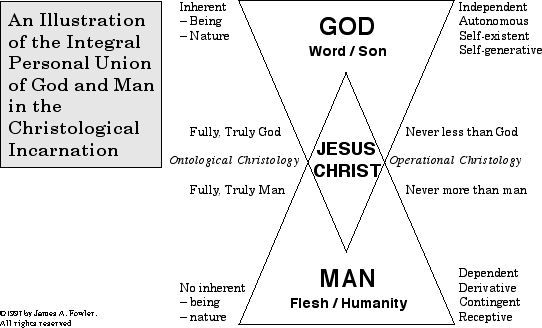©
1999 James A. Fowler
You are free to download
this outline provided it remains intact without alteration. You
are also free to transmit this outline electronically provided
that you do so in its entirety with proper citation of authorship
included.
CHRISTOLOGY
I. Biblical references to "Christology"
A. There are no Biblical usages of
the word "Christology"
1. "Christology"
is derived from two Greek words
a.
Christos meaning "Christ"
b.
logos meaning "word, reason, study of"
2. "Christology"
is the study of the Person of Jesus Christ
a.
distinct from "soteriology," which is the study of
the work of Jesus Christ in redemption
and
salvation.
b.
Christology addresses the issue of Jesus being both God and man,
and becoming such
in
the incarnation
(1)
Scripture has abundant references both to the deity and humanity
of Jesus
(2)
"Christology" attempts to correlate and explain how
Jesus could be both God and
man
in the same person.
B. Some references to Jesus' Deity
1. Pre-existence
- Jn. 1:1,2; 17:5; Phil. 2:6; Col. 1:17; Rev. 1:8
2. Creator
- Jn. 1:3,10; I Cor. 8:6; Col. 1:16
3. Sustainer
- Col. 1:17; Heb. 1:3
4. Source
of life - Jn. 5:26; 11:25; 14:6; 17:3; Rom. 6:23; I Jn. 5:12
5. Revealer
of God - Matt. 11:27; Jn. 1:18; 14:7; II Cor. 4:4; Heb. 1:3
6. Son
of God - Mk. 1:1; 9:7; Lk. 1:35; Jn. 1:34; 10:36; Rom. 1:4
7. Identified
as God - Jn. 5:18; 10:30; Phil. 2:6; Col. 1:19; 2:9; Titus 2:13;
Heb. 1:8; I Jn. 5:20
8. I AM
- Mk. 14:62; Lk. 22:70; Jn. 8:24,58; 11:25; 14:6; 18:5
9. Trinity
- Matt. 28:19; I Cor. 12:4-6; Eph. 3:14-17
10. Holy One
- Mk. 1:24; John 6:69; Acts 2:27; 3:14
11. Object of
faith - Mk. 8:34-38; Jn. 6:29,40; I Jn. 5:13
12. Forgives
sin - Matt. 9:6; Mk. 2:7,10; Lk. 5:21,23; Acts 5:31
13. Savior -
Matt. 1:21; Lk. 2:30; Jn. 1:29; 4:42; Acts 4:12; 5:31; Heb. 5:9;
II Pt. 1:1,11
14. Lord - Lk.
2:11; John 20:28; Rom. 10:9,12; 14:9; I Cor. 12:3; II Cor. 13:14;
Eph. 4:5;
Rev.
17:14
15. Pre-eminent
- Eph. 1:20-22; Col. 1:18; 2:10
16. Judge - Matt.
7:21-23; 25:31-46; Jn. 5:22-30; II Cor. 5:10; II Tim. 4:1,8
17. Worshipped
- Acts 7:55,59; Phil. 2:8,9; Heb. 2:9; Rev. 3:21
C. Some references to Jesus' humanity
1. Genealogy
- Matt. 1:1-17; Lk. 3:23-38
2. Birth
as infant - Matt. 2:1; Lk. 2:7; Rom. 1:3; Gal. 4:4
3. Human
flesh - Lk. 24:39; Jn. 1:14; Rom. 8:2; Heb. 2:14; I Jn. 4:2
4. Tangible
- Col. 2:9; I Jn. 1:1-3
5. Development
and growth - Lk. 2:40,46,51
6. Human
senses - Matt. 4:2; Jn. 4:6; 11:34; 19:28
7. Emotion
- Matt. 9:36; 26:37-40; Mk. 10:21; Lk. 10:21; Jn. 11:35; 12:27
8. Temptation
- Matt. 4:1-11; Lk. 4:1-3; 22:44; Heb. 2:18; 4:15; 5:7
9. Prayer
- Matt. 14:23; Mk. 1:35; Lk. 5:16; 22:39,41
10. Derivative
activity - Jn. 8:28; 14:10; Acts 2:22
11. Death - Jn.
19:30; Phil. 2:8
12. Son of Man
- Mk. 8:31; 9:12; 10:33
13. Man - Acts
2:22; Rom. 5:15; I Cor. 15:21; Phil. 2:7,8; I Tim. 2:5
D. Particular references to God becoming
man in the incarnation of Jesus
John 1:1,14
- "the Word was God...the Word became flesh..."
Rom. 1:3
- "His Son, who was born a descendant of David according
to the flesh"
Rom. 8:3
- "God sending His own Son in the likeness of sinful flesh...
condemned sin in
the
flesh"
Rom. 9:5
- "the Christ according to the flesh"
Gal. 4:4
- "in the fullness of time, God sent forth His Son, born
of a woman"
Phil. 2:5-8
- "Christ Jesus...existed in the form of God..., but emptied
Himself, taking the
form
of a bond-servant, being made in the likeness of men...found
in appearance as a
man..."
I Tim.
3:16 - "He who was revealed in the flesh"
Heb. 2:14
- "He Himself likewise partook of the same (flesh and blood),
that through death
He
might render powerless him who had the power of death...the devil"
I Jn. 1:1,2
- "the Word of Life...was manifested"
II. A brief history of Christian discussion concerning
the Christological incarnation
A. Greek Gnosticism suggested Jesus
only "appeared" to be human - Docetism
B. Ebionites (Jewish Christians) asserted
Jesus was fully human, and Holy Spirit descended
upon Him
at baptism - Adoptionism.
C. Arius (c. 250-336) argued that Jesus
was subordinate to God the Father. "There was a time
when the
Son was not" - Subordinationism; denial of pre- existence.
D. Council of Nicea (325) affirmed that
Jesus was fully God and fully man in homoousion.
E. Apollinarius (c. 310-380) posited
that human rational soul of Jesus was replaced by divine
logos
in single nature - Monophysitism
F. Gregory of Nazianzus (330-389) stated,
"the unassumed is the unhealed"
G. Nestorius (c. 380-451) suggested that
there were two separate beings in Jesus Christ; no real
union
H. Eutyches (c. 378-454) indicated that
the human nature was absorbed into the divine in a
synthesis
- Absorption
I. Tome of Pope Leo (449), Council
of Chalcedon (451) established orthodoxy as "two natures
(divine
and human) in one hypostasis or Person (Lat. personae)."
J. Leontius of Byzantium (c. 500-560)
introduced concept of enhypostasia, that human nature
of Jesus
did not have independent existence.
K. German theology of 18th and 19th centuries
- quest for "historical Jesus." Led to R.
Bultmann's
"demythologization"
L. Nineteenth century theology - argument
of kenotic theories of Christology
M. Karl Barth (1886-1968) - Christocentric
revelation of God. Humanity of God- assumption
of humanity
into Deity, leading to universalism.
III. Issues of consideration concerning the Christological
incarnation
A. What is meant by God and man?
1. Identifying
God
a.
Word of God - Jn. 1:1,14
b.
Son of God - Rom. 1:3; 8:3
c.
God the Father
d.
Holy Spirit
e.
Deity, Divinity, Godhead
2. Identifying
man
a.
Flesh - Jn. 1:14; Rom. 8:3
b.
Physical embodiment
c.
Human form - cf. Phil. 2:7
d.
Human individual
e.
Humanity at large; human race
B. How can deity and humanity be unified?
1. Attributes
and functions appear mutually antithetical
God
Infinite
Eternal
Omnipresent
Spirit
Not visible
Not temptible
Not mortal
Independent
autonomous
|
Man
Finite
Temporal
Space-time limitation
Tangible
Visible
Temptible
Mortal
Dependent, derivative |
2.
The Creator/creature distinction must always be maintained, and
never allowed to merge
monistically.
C. How is it that two become one?
1. Identifying
the twoness - what is commonality of God and man?
a.
Persons
b.
Beings
c.
Natures
d.
Substances
e.
Essences
2. Identifying
the oneness
a.
Person
b.
Nature
c.
Distinction
d.
Individual
e.
Embodiment
f.
Personification
D. What type of union is formed?
1. Biblical
statements
a.
Word became flesh - Jn. 1:14
b.
Son in the likeness of sinful flesh - Rom. 8:3
c.
taking the form of a bond-servant - Phil. 2:7
d.
being made in the likeness of men - Phil. 2:7
e.
partook of flesh and blood - Heb. 2:14
f.
Word of Life was manifested - I Jn. 1:1,2
2. Human
explanations
a.
Synthesis
b.
Hybrid
c.
Conglomeration
d.
Amalgamation
e.
Combination
f.
Consolidation
g.
Fusion
h.
Association
i.
Unification
E. Necessary balance
1. Ontological
Christology (Being)
a.
Being, nature, life inherent in God
b.
Even if one can conceive of Jesus being God and man simultaneously;
it seems
impossible
to fathom the simultaneous function/behavior/action of God and
man.
2. Operational
Christology (Action)
a.
Kenotic "emptying" of Phil. 2:7 cannot refer to ontological
Being, and must therefore
refer
to operational Action of the voluntary laying aside of the prerogative
of
independent
Divine action.
F. Some additional questions
1. If we
refer to "two natures" or any other commonalities of
God and man...
a.
does this not establish an equality or equity?
b.
Is this based on inadequate anthropological understanding?
2. Is the
union of God and man in Jesus Christ an eternal union?
a.
Not in same sense as eternal unity of Godhead in Trinity
b.
The union was commenced in time - Gal. 4:4
c.
Is the God-man union everlasting? If so...
(1)
Does Jesus still have physical flesh, embodiment?
(2)
Is Jesus human forever?
(3)
Does the humanity of Jesus come to indwell us also?
(4)
Is Jesus still visible, mortal, temptible, dependent?
3. Did
God become man?
a.
Not a Biblical statement
b.
Is this statement overly inclusive and unitary?
IV. Implications of attempting to understand the Christological
incarnation
A. Correlation of Trinitarian and
Christological considerations
1. 3 in
1 of Trinity sets up 2 in 1 of Christology
2. Sequence
of unity and union considerations
a.
Trinity - essential Divine unity
b.
Christology - integral personal union
c.
Christian and Christ - indwelling identificational union
B. Alternative responses to the Christological
incarnation
1. Reject
as unreasonable - absurdity
2. Reduce
to human reason by attempting to resolve antinomies; inevitably
emphasize deity
or
humanity to neglect of other
3. Accept
the revelation of God concerning Christological incarnation
a.
finite human reason will never explain or define
b.
must accept manner in which God has revealed Himself
c.
failure to do so is deification of human reason
C. Accepting the imprecision of Christological
explanation and definition
1. Vagaries
of translation and interpretation of meaning from the very beginning
of such
Christological
study
a.
Greek ousia translated as Latin substantia or essentia
b.
Greek phusis translated as Latin substantia
c.
Greek hypostasis translated as Latin personae,
subsistentia
2. Early
creeds and formulations not as precise as many Christians think.
3. Man's
finite understanding still attempting to explain
D. Must look beyond Christological explanations
1. Don't
want to get mired in abstractions of thought
2. Teleological
purpose of Christological incarnation
a.
II Cor. 5:19 - "God was in Christ reconciling the world
to Himself"
b.
"Man Christ Jesus" (I Tim. 2:5) serves as "one
mediator between God and man"
(1)
having effected redemption by taking the death consequences of
sin vicariously
on
man's behalf,
(2)
in order to reinvest and restore Divine life (I Jn. 5:12) and
Divine nature (II Pet. 1:4)
to
man by His Spirit.
|



















